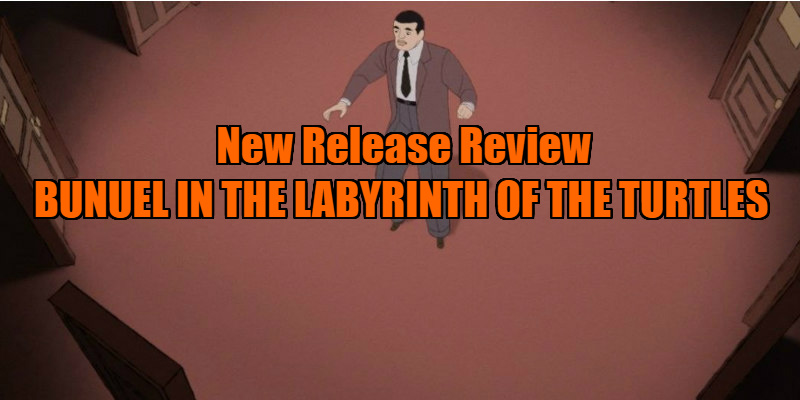
Funded by a friend's lottery win, Luis Buñuel sets off to make a documentary about a deprived Spanish village.
Review by Eric Hillis
Directed by: Salvador Simó
Starring: Jorge Usón, Fernando Ramos, Luis Enrique de Tomás, Cyril Corral, Javier Balas

Coming off the back of his movement defining surrealist short Un Chien Andalou and his feature debut L'Age d'Or, Luis Buñuel should have been on top of the world in the early 1930s. But, disagreeing over politics, ideology and the function of art, Buñuel fell out with his collaborator Salvador Dalí, whom he resented for soaking up the credit for films which Buñuel considered mostly his own creation. While cinephiles lauded Buñuel, the Parisian elite slammed its doors in his face, accusing him of being an atheist and a communist. Under pressure from The Vatican, the French distributors of L'Age d'Or pulled the film from circulation, and it wouldn't be seen again until as late as 1979.
Adapted from Fermín Solís's graphic novel 'Buñuel en el laberinto de las tortugas', director Salvador Simó's animated feature Buñuel in the Labyrinth of the Turtles follows the Spanish filmmaker as he attempts to move on to his next project, a documentary about Las Hurdes, a deprived region of rural Spain, which comes to be known as Las Hurdes: Tierra Sin Pan (Land Without Bread).

Buñuel's ability to make the film hinges on an extraordinary stroke of luck. After a night of drinking, Buñuel's sculptor friend Ramón Acín buys a lottery ticket and promises the filmmaker that should he win the cash prize, he'll fund the documentary. Lo and behold, a few days later Buñuel receives a phone call from Acín, who has just won a windfall of a hundred thousand pesetas. Recruiting his cameraman Eli Lotar and assistant director/writer Pierre Unik, Buñuel's gang of four make the voyage to the depths of rural Spain to document life in one of Europe's poorest regions.
[ READ MORE: New Release Review - Come As You Are ]
The narrative that follows raises the classic question of how artists can best serve the downtrodden. Like Joel McCrea's high-minded director in Preston Sturges' Sullivan's Travels, Buñuel believes in portraying the brutality of life for these people, even if he has to fake said brutality himself. Just as an island only becomes so when you look at it from the water, poverty is relative to the status of whomever observes it. By any metric, the people of Las Hurdes have things bad, but they've never experienced anything better, so they're quite happy in their lot. One local man boasts about how his home is large enough to house both his extended family and his animals, but his pride is contrasted with the filmmakers, who flee in disgust when they get a whiff of the smell of his home. For whom will the documentary be made? The people of Las Hurdes? Or a bourgeois audience who can tut tut while feeling relieved about their own comfortable lives?

Buñuel's maniacal approach to creating his idea of the misery of the region, which includes some horrifying animal cruelty (making this the animated equivalent of Cannibal Holocaust), sees him at loggerheads with Acín. The director seems to have no interest in capturing the truth of the people of Las Hurdes, rather his own vision of their lot. But then he comes across a young girl dying of pains in her stomach, and it begins to dawn on him that his subjects are real people, not actors he can move around at his whim.
[ READ MORE: New Release Review - Piranhas ]
Simó's film consists of simple but effective animation, and some images are genuinely beautiful. His animators capture the unique light of rural Spain, and its contrast with the gloomy extracts of the black and white Land Without Bread act as a subtle but stark commentary on how poverty is lived from within against how it's observed from without. Simo indulges himself with some surreal touches of his own, plaguing Buñuel with nightmares involving his father and idealistic reminiscences about his mother, whom he even confuses with the Virgin Mary in one dream.

Buñuel in the Labyrinth of the Turtles offers more than enough thematic depth to satisfy Buñuel enthusiasts and a general adult audience. Cinephile parents may see it as an opportunity for early indoctrination for their kids, but any temptation will be tempered by the scenes of real life animal torture, both animated and in the brutal extracts of Buñuel's documentary. In such a way it serves as an ideal teaching lesson to communicate the important ability to separate art from the artist, and to question the truth of images presented as fact.

Buñuel in the Labyrinth of the Turtles is on BFI Player now.
"All three movies see Lugosi essaying demented doctors, but he brings something different to each role."— The Movie Waffler (@themoviewaffler) July 15, 2020
THREE EDGAR ALLAN POE ADAPTATIONS STARRING BÉLA LUGOSI is on blu-ray Monday from Eureka Entertainment.
Read @hilliseric's reviewhttps://t.co/QLm5nKNCvR pic.twitter.com/LaCIceL000

